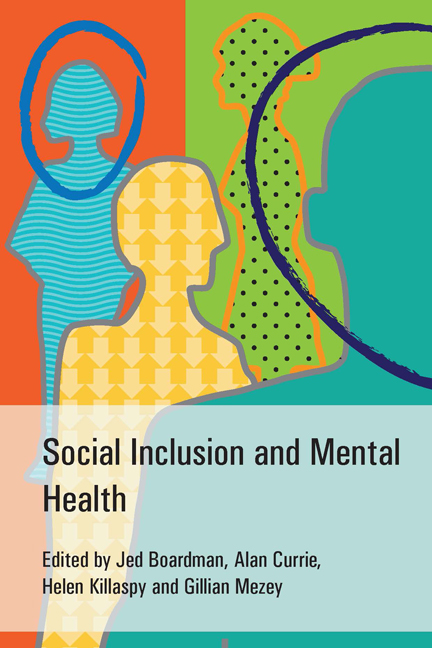Book contents
- Frontmatter
- Contents
- List of contributors
- List of tables
- Foreword
- Preface
- Acknowledgements
- Scoping Group on Social Inclusion, Royal College of Psychiatrists
- Part 1 What is social exclusion?
- Part 2 Social exclusion: the scope of the problem
- Part 3 Working towards inclusive psychiatry
- 13 Social inclusion: research and evidence-based practice
- 14 Implications of social inclusion for individual practice
- 15 Socially inclusive mental health services: what will they look like?
- 16 Training for socially inclusive practice
- 17 Community mental health and the inclusion–exclusion seesaw
- 18 Socially inclusive practice and psychiatry in the 21st century
- Index
16 - Training for socially inclusive practice
from Part 3 - Working towards inclusive psychiatry
- Frontmatter
- Contents
- List of contributors
- List of tables
- Foreword
- Preface
- Acknowledgements
- Scoping Group on Social Inclusion, Royal College of Psychiatrists
- Part 1 What is social exclusion?
- Part 2 Social exclusion: the scope of the problem
- Part 3 Working towards inclusive psychiatry
- 13 Social inclusion: research and evidence-based practice
- 14 Implications of social inclusion for individual practice
- 15 Socially inclusive mental health services: what will they look like?
- 16 Training for socially inclusive practice
- 17 Community mental health and the inclusion–exclusion seesaw
- 18 Socially inclusive practice and psychiatry in the 21st century
- Index
Summary
In Chapters 14 and 15 we set out some of the components for the future of socially inclusive psychiatric practice and service delivery. In this chapter we examine some of the implications of this for the training of psychiatrists. It is important that the principles of social inclusion and recovery are embedded in the training of future psychiatrists, whether they be medical students or psychiatric trainees, and in the continuing professional development of consultant psychiatrists and non-consultant grades. This shift in training also applies to other mental health professionals and a consensus across these groups needs to be developed as to what is required in training and practice to deliver the shift from conventional to socially inclusive practice.
The training and policy context
Policy drivers
There have been a number of policy drivers to promote social inclusion and to reduce stigma and discrimination in mental health service users, including the recovery approach, the expert patient initiative and New Ways of Working, which we have outlined in Chapter 4. In addition, two further policies that relate to socially inclusive practice are: the Race Equality Action Plan and the Disability Discrimination Act 1995 (with 2001 and 2005 amendments) (Sayce & Boardman, 2003, 2008).
Revision of postgraduate medical training
The changes to the curriculum for trainee psychiatrists of the Royal College of Psychiatrists (2009) seen since 2000 and the move towards the acquisition of specific competences during training (knowledge, skills and behaviour) provide an opportunity to ensure that social inclusion is incorporated as a unifying theme of mental health service provision. Social inclusion in mental healthcare can be seen as part of a cultural shift towards patient/ user choice, empowerment and partnerships between patients and carers, as opposed to the traditionally didactic and disempowered status of mental health users, particularly in relation to their consultant psychiatrists.
There has been a radical overhaul of postgraduate medical training, resulting in the development of specialty-specific training posts, a new curriculum and the development of competence-based assessments. The main psychiatric specialties, represented by the Faculties of the Royal College of Psychiatrists, have been involved in developing their own competence-based curricula and workplace-based assessments for trainees. Social inclusion competences need to be incorporated into these frameworks.
- Type
- Chapter
- Information
- Social Inclusion and Mental Health , pp. 331 - 344Publisher: Royal College of PsychiatristsFirst published in: 2017

